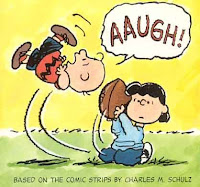+15:00 Zwedru~
Funny how 350 miles can take so long to cover. After a nice 15 hours drive, we were able to

reach my home for the next week. Three of us -Joe, his sister and myself - piled into a Nissan Sunny, with bags stuffed into the trunk and throughout the car, made the travel with a driver who would only say his name was AB. My first sight of what would be a completely different road trip from any other I've taken occurred just outside of Monrovia.
We pulled over to get gas. But instead of a gas station with pumps we had glass jars and funnels. Kids and teens would pour the gas through the funnel into the tank, with the driver rocking the car to make sure the car was filled to the brim.

Then he loaded another five gallons into a plastic jug, placed it in the trunk, and repacked our luggage with it. That way he wouldn't pay as much for gas when he was in Zwedru. I did note, however, that the gas was $185LBD/Gallon, or $2.93US/Gallon. I also learned that gas is pink. Who would've guessed?
To add to the fun, once we got into Bong County (counties are the equivalent to states), he pulled over again to fix the car. This time, he wanted to install new brake-pads and spark plugs. This is where I got a better glimpse of my surroundings. The countryside is just beautiful. Most of the country is a rainforest, but we would drive in and out of it into grasslands, which just made for beautiful landscapes. The people, who were mostly very friendly, would stop in their tracks to take note of the

"white man" who has entered into their world. Some would make double-takes, others would stop and say hi, and others wanted to talk to me. It was fun to listen to them speak and try to understand what was being said. I failed miserably at times and Joe had fun with that, but I began to get the swing of things.
I noticed a lot of signs posted throughout the country. They would display crude drawings with various propaganda, such as "Many Tribes, One Liberia" and "No Sex for Work, No Work for Sex," and "TB is Not a Curse, There is a Cure."
As we were waiting for the driver to finish working on the car, we bought some oranges from a lady who was peeling the outer layer

but keeping the fruit inside still. I had never had an orange like this. It tasted a little different than Florida oranges, less citrus more sweet. I also had it by cutting the top off the sphere and basically sucking whatever juice and fruit I could get. A much messier way of doing it then slicing an orange up. But a much better taste than the orange juice I had in Brussels the day before.
I also received my first offer for a meal. The lady and her friend offered a home for me to sleep and a meal that evening. It was something called GB, which I am unsure of what it is, but Joe was laughing at the concept. I'm going to assume I should stay away from it.
After the repairs, we drove on. I learned very quickly that these roads are nothing like what I drive on back home. Half of the highway we were on was paved, right on through Ganta, but they were littered with potholes.

Some areas had more gravel than road because of the rain and neglect. What was amazing was how the driver would speed through the road, swerving around every crevice and then slow down to cover the larger holes. He was blaring his horn at great frequency, putting to sham any New Yorker or Chicagoan. We would pass other Sunny's transporting Liberians, stuffed six or seven to a car and sometimes with riders on top of the car, and then we would pass pickup trucks loaded with various cargo - including a few with plants stacked three times the size of the truck itself.
We would stop on occasion for the driver, and whomever else, to use the restroom. Only problem is there is no restroom along the road. Instead, you pull over and have the men walk one direction and the women the other. You go about 10 feet into the forest and then come back.
Now, not everything was easy and smooth. There were immigration checkpoints littered throughout the country. Sometimes they would just look at my passport and let us go on our way (after the driver gave a small donation to the officer's wallet). Other times they would delay us in some effort to gain money out of me. They would look at my passport, as various questions and continue to cause delays (even saying I didn't have a visa while they were looking at the visa). It was a complete crapshoot, but after the 7th checkpoint, which we arrived at sometime after 4 in the morning, it is just a tiring effort.
There were time when we would stop in a city for various reasons. When we stopped in Ganta, which is the second largest city and just a 15 minute walk from Guinea, I witnessed a large number of people, late at night, who constantly shopped and talked with neighboring Africans. Many had never seen an American and many more just wanted something from anyone. They would walk up, making kissing noises or clicking noises to get your attention, and thrust some product in your face. Usually is was food or water, but sometimes it was pirated DVDs or clothing. Each time you have to tell them you have no money or they will continue to get you to give them money.
Around 5:30 in the morning we reached the pastor's house. I didn't realize the amount of dust we accumulated on the non-paved roads (which stretched half of the trip). My jeans were a nice red hue along with my hat, bags and everything else we had in the car. After a quick bath, which was a bucket of water with a towel and soap (and very refreshing after the long drive), I climbed into bed and slept. For eight hours.

The next afternoon, I as awoken by singing. Outside, a small group of women from the church welcomed me to Africa with songs in their native tongue, Krahn. It was really wonderful music. You could tell they were happy to be able to welcome new visitors to their town. Dressed in traditional clothing, all of which was very bright and colorful, the leader introduced everyone gathered. Naturally, I didn't understand a word as it was also in Krahn, but Joe was helpful to translate for me.
Shortly afterwards, the men arrived to welcome us. Apparently, the men and women do a lot of things separately. They also introduced themselves, but only while seated in chairs and in English. Not that it helped much, since their dialect makes it difficult to casually understand. They talked about the church and Zwedru. It was nice, but they really lit up when I showed them photos of the Chicago Bulls game I went to Tuesday. Amazing how sports brings everyone together.
When everyone left, I finally had a meal. This was the first time I had eaten, aside from a protein bar in Monrovia and the oranges in Bong County, since Brussels. We had rice with a sauce made of okra and duiker, a type of deer native to Sub-Saharan Africa. The food was great, and very spicy. If all the food is like this, I'll need a lot of water because the heat it provides rivals much of what I've had in the States, and I've eaten a lot of spicy food.
I am grateful my travelling has ended for now. It has been a long few days, and very little sleep to accompany it. The rest of the day is geared to rest and relax after the trip here and I'm going to enjoy every minute of it. I have enjoyed my brief visits from the church members so far and no doubt will have many more visits coming throughout the week. This has truly been an adventure so far, and I cannot wait to find out what unfolds.
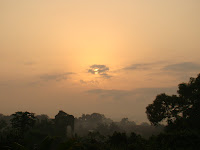 This was a good exercise in patience, because most Americans do not have it. I will admit it was frustrating, and a bit worrisome, not knowing if I was going to make it to Monrovia in time to confirm my flight and return home. But as the day wore on, and as Joe made arrangements for my flight confirmation, my anxiety diminished and I began to take life in stride.
This was a good exercise in patience, because most Americans do not have it. I will admit it was frustrating, and a bit worrisome, not knowing if I was going to make it to Monrovia in time to confirm my flight and return home. But as the day wore on, and as Joe made arrangements for my flight confirmation, my anxiety diminished and I began to take life in stride. 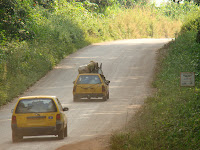 After I had said goodbye to the Dwehs, except the pastor who was travelling with us, I nestled into what would be my seat for the next 13 hours and took one last, longing look at the town that opened my eyes to a whole new world. Saying goodbye to a family can be hard, but saying goodbye to a place that has changed my entire outlook on life is nearly impossible.
After I had said goodbye to the Dwehs, except the pastor who was travelling with us, I nestled into what would be my seat for the next 13 hours and took one last, longing look at the town that opened my eyes to a whole new world. Saying goodbye to a family can be hard, but saying goodbye to a place that has changed my entire outlook on life is nearly impossible. 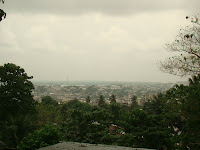 The city landscape is vastly different from many I have seen before. The cities are mixed between glorious buildings symbolic of the rebuilding occurring in the war-torn nation alongside bombed-out shelters. The nation's capitol building is across the street from a walled structure that once maintained some home or business but not acts as a shelter for many families. The walls are blackened by fires long extinguished and the signs of a war that nearly destroyed the oldest African republic are evident throughout. There is little joy taken from the sights of children scrounging for food or families living in gutted buildings, barely surviving beyond the day. It is a stark contrast to the quiet life in Zwedru.
The city landscape is vastly different from many I have seen before. The cities are mixed between glorious buildings symbolic of the rebuilding occurring in the war-torn nation alongside bombed-out shelters. The nation's capitol building is across the street from a walled structure that once maintained some home or business but not acts as a shelter for many families. The walls are blackened by fires long extinguished and the signs of a war that nearly destroyed the oldest African republic are evident throughout. There is little joy taken from the sights of children scrounging for food or families living in gutted buildings, barely surviving beyond the day. It is a stark contrast to the quiet life in Zwedru. 
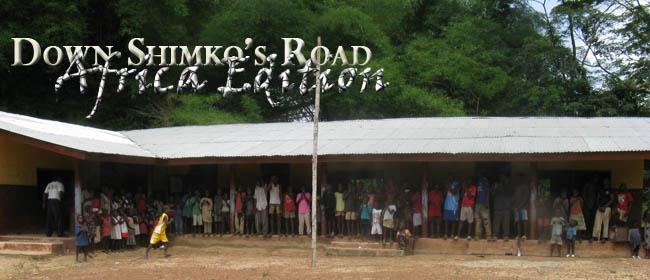






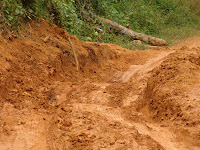













 Because of this situation, when I brought the money raised from St. Mark's, we didn't tell them it came from me or that I brought the money. Instead, Joe would explain that Americans who care about what is going on through the Liberian Children's Ministry have provided the funding
Because of this situation, when I brought the money raised from St. Mark's, we didn't tell them it came from me or that I brought the money. Instead, Joe would explain that Americans who care about what is going on through the Liberian Children's Ministry have provided the funding 











